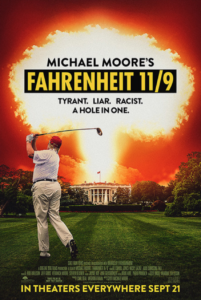Returning to his biggest box office victory, documentarian provocateur Michael Moore covers too much ground this time around.

 It’s been 14 years since “Fahrenheit 9/11” amassed more than $222 million in worldwide box office on a paltry $6 million budget. A bonafide phenomenon, the film is the top-grossing documentary of all-time. And although filmmaker Moore had already won the Oscar with “Bowling for Columbine,” it was “Fahrenheit” that provided him with massive cross-over appeal. And his work thereafter has never been as focused.
It’s been 14 years since “Fahrenheit 9/11” amassed more than $222 million in worldwide box office on a paltry $6 million budget. A bonafide phenomenon, the film is the top-grossing documentary of all-time. And although filmmaker Moore had already won the Oscar with “Bowling for Columbine,” it was “Fahrenheit” that provided him with massive cross-over appeal. And his work thereafter has never been as focused.
The latest example of Moore’s decline is another didactic exercise in bashing the party in power, an arguable cupcake job given the current occupant of the White House. Unfortunately, in his zeal to cover all the bases and, above all, entertain the adoring masses, Moore lacks a sophisticated central thesis aside from a vague call to vote. Of course, his belief is that those not voting will vote for his chosen agenda. It’s an idealistic fantasy.

To be fair, “Fahrenheit 11/9” is fun early. It opens with a comical view of the 2016 election night shocker. We are treated to Moore’s sarcastic narration running under news footage covering the Clinton and Trump evening parties. His clever use of shots reinforce his theory that the Trump campaign’s relative somber mood meant that they never expected to win. Moore’s comedy routine reaches a wonderful crescendo with a nicely chosen expletive followed by the title credit. It will make the avid Moore fan and Trump hater positively giddy.
Moore then answers his opening question by blaming Bill Clinton and his triangulating political genius for the ultimate rise of Trump, who Moore theorizes ran for President as a publicity stunt. The “stunt” theory is nothing new, but Moore does a good job laying it all out (singer Gwen Stefani is also blamed). Of course, the whimsical evidence he presents is largely opinion-based and sourced from one side of the aisle. If only he had stayed exclusively on how Trump could have been elected and reduced the length of “11/9.” But the remarkable President Trump origin story makes up just act one of Moore’s documentary.

In an attempt to cover his hometown of Flint, Michigan, Moore trains his camera on the water crisis that afflicted the depressed city. And his framing of the tragic problem is solid and interesting. But instead of letting the players tell their story, Moore inserts himself into the narrative performing his typical entertaining antics. And to that end, he rents a water truck, fills it up with city water from Flint and sprays it all over the lawn of the Michigan governor’s mansion. And in another sequence, in a trite, almost disrespectful manner, Moore marches to the Michigan capital with a pair of handcuffs to effectuate a citizen’s arrest. It’s funny, but outrageous and empty. And this sequence links Obama to the failed response to the disaster. Moore makes a concerted effort to implicate everyone regardless of their political affiliation.

From Flint, Moore moves to Parkland, Florida, and the devastating massacre at Stoneman Douglas High School. Against zippy background music, he gains the confidence of several student survivors. He’s shown making a clandestine entrance into a building that houses a student group’s mobilization headquarters. Coverage of these current events, including the landmark student march, is nothing new, but it’s undeniably moving and inspiring. But when he tries to link the passion of the young organizers with his own history, one student laughs, holds up her iPhone, and credits social media for her upbringing. And David Hogg admits that they had blown off an exam at school in order to take down a politician.

Like so much in “11/9,” the Parkland story deserves its own film. Moore attempts to unite all of the various threads around a call to action: vote. And while there’s nothing wrong with such a message, the movie is overstuffed, and Moore’s constant narrating drone is unceasing, reaching sensory perception overload early. Over a two plus hour running time, he tells the viewer what to think instead of giving the audience a chance to think. This makes this film his least compelling screed to date.

